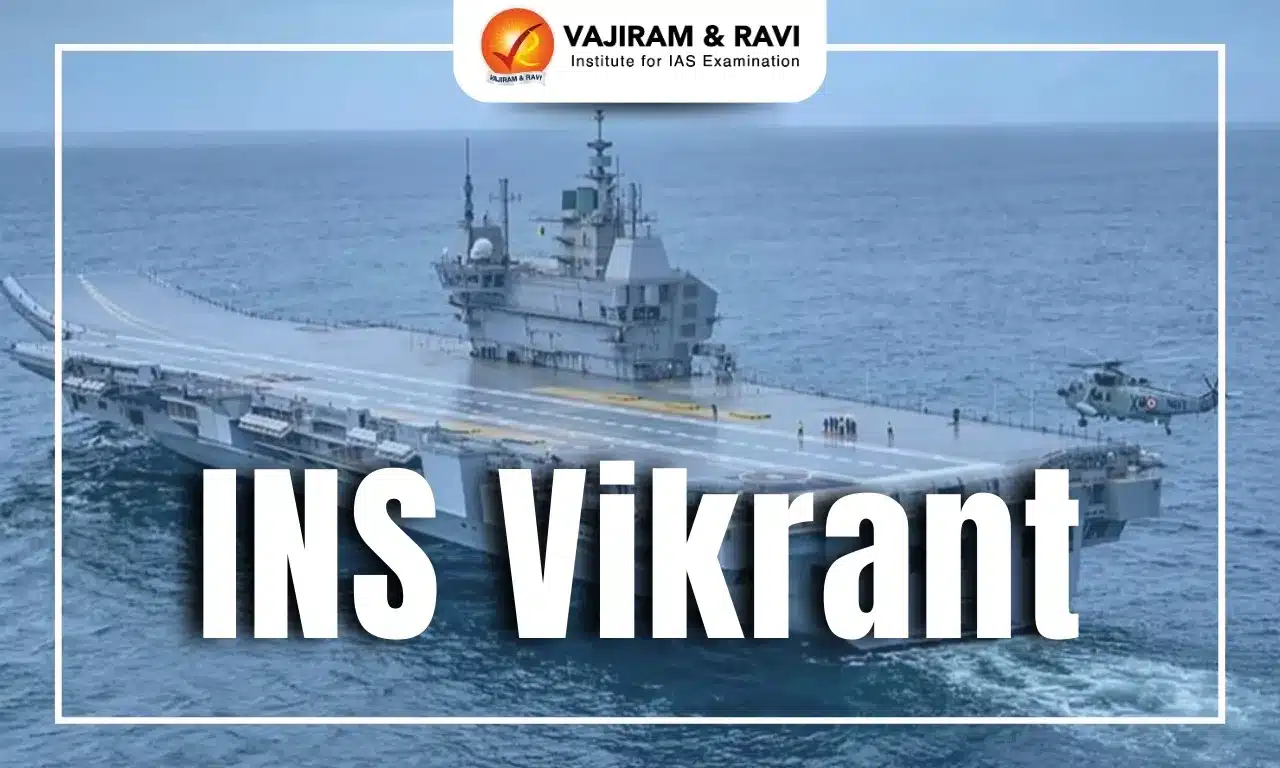In a major development, the Indian Navy has withdrawn its Indigenous Aircraft Carrier, INS Vikrant, from active deployment in the Arabian Sea, depicting the significant shift in India's maritime strategy. This decision arises against increasing regional tensions and significant strategic shifts, especially concerning Pakistan and China.
INS Vikrant officially joined the Indian Navy’s Western Naval Command in August 2024, and had been operating alongside INS Vikramaditya as part of India's dual-carrier battle group. The carrier had recently played an important role in high-intensity joint-domain exercises in the Arabian Sea, operating alongside Kolkata-class destroyers, Talwar-class frigates, and Kalvari-class submarines. Image released by a Satellite dated April 23, 2025, had confirmed INS Vikrant forward positioning off the coast of Karwar, Karnataka, strategically close to Pakistan’s maritime borders.
However, as of April 27, 2025, reports confirmed that the Vikrant has been pulled back and is now stationed at INS Kadamba Naval Base in Karwar. This withdrawal marks a shift in India’s operational posture, moving away from direct pressure tactics against Pakistan.
Also Read: S-400 Defence System
INS Vikrant Changing Strategy
The withdrawal of INS Vikrant depicts a shift in India’s military priorities in response to the rapidly evolving security environment. The deployment served as an example of strength against Pakistan, enhancing India's capacity to oversee important maritime routes; the latest decision reflects a broader repositioning of national defense strategies.
Indian Navy focus is increasingly adjusting to address emerging threats within the Indo-Pacific region, particularly to counter China’s growing presence through initiatives such as the Belt and Road Initiative (BRI) and the maritime Silk Road. Emphasis is now being placed on fortifying the eastern maritime frontiers and increasing the deeper strategic partnerships with nations like the United States and Japan.
Indigenous INS Vikrant
Commissioned in September 2022, INS Vikrant stands as a symbol of India's maritime self-reliance under the “Aatmanirbhar Bharat” initiative. Built with over 76% indigenous components at Cochin Shipyard Limited (CSL), the carrier stretches 262 meters in length, displaces 40,000 tonnes, and can operate up to 40 aircraft, including MiG-29K fighters and MH-60R helicopters.
Vikrant’s STOBAR (Short Take-Off But Arrested Recovery) configuration allows for the launch and recovery of fighter jets, enabling it to project power across the Indian Ocean Region (IOR). Its defensive systems, including Barak 1 and Barak 8 missiles, Otobreda 76 mm guns, and AK-630 CIWS, ensure comprehensive layered defense against aerial and missile threats.
The carrier's recent modernization in 2024 further enhanced its combat systems, radars like EL/M-2248 MF-STAR AESA, and long-range surveillance capabilities with the Selex RAN-40L radar, boosting its operational resilience.
Also Read: Operation Sindoor
INS Vikrant Implications
India’s decision to withdraw INS Vikrant may be viewed as a calculated move to ease tensions with Pakistan, yet it does not signify any dilution of the nation’s military strength. Instead, the move reflects India’s strategic adaptability.
While Pakistan had earlier raised alarms over India’s dual-aircraft carrier capability, this development might be perceived in Islamabad as a de-escalation of immediate threat levels. India’s maritime superiority remains firmly intact, especially in light of Pakistan’s comparatively limited naval preparedness, characterized by outdated submarines and an underdeveloped surface fleet still in progress.
On the global front, India's withdrawal of INS Vikrant will be closely watched by Indo-Pacific stakeholders. As India strengthens its QUAD partnerships and focuses on countering Chinese maritime expansion, redeploying key assets like Vikrant could be part of a larger strategic repositioning.
INS Vikrant Future
Despite its withdrawal from the Arabian Sea, INS Vikrant continues to represent an important aspect of India’s maritime capabilities. The Indian Navy remains committed to an ambitious modernisation agenda, with upcoming initiatives including the additional aircraft carriers, nuclear-powered submarines, and enhanced surface combatants. As India navigates complex regional geopolitics, maintaining readiness, adaptability, and credible prevention will remain central to its naval doctrine.
Last updated on February, 2026
→ UPSC Notification 2026 is now out on the official website at upsconline.nic.in.
→ UPSC IFoS Notification 2026 is now out on the official website at upsconline.nic.in.
→ UPSC Calendar 2026 has been released.
→ UPSC Final Result 2025 is expected to be released soon.
→ Check out the latest UPSC Syllabus 2026 here.
→ Join Vajiram & Ravi’s Interview Guidance Programme for expert help to crack your final UPSC stage.
→ UPSC Mains Result 2025 is now out.
→ UPSC Prelims 2026 will be conducted on 24th May, 2026 & UPSC Mains 2026 will be conducted on 21st August 2026.
→ The UPSC Selection Process is of 3 stages-Prelims, Mains and Interview.
→ Prepare effectively with Vajiram & Ravi’s UPSC Prelims Test Series 2026 featuring full-length mock tests, detailed solutions, and performance analysis.
→ Enroll in Vajiram & Ravi’s UPSC Mains Test Series 2026 for structured answer writing practice, expert evaluation, and exam-oriented feedback.
→ Join Vajiram & Ravi’s Best UPSC Mentorship Program for personalized guidance, strategy planning, and one-to-one support from experienced mentors.
→ Check UPSC Marksheet 2024 Here.
→ UPSC Toppers List 2024 is released now. Shakti Dubey is UPSC AIR 1 2024 Topper.
→ Also check Best UPSC Coaching in India
INS Vikrant FAQs
Q1. What happened to INS Vikrant?+
Q2. Which is the biggest ship in India?+
Q3. What is the difference between INS Vikrant and Vikramaditya?+
Q4. Which is India's largest aircraft carrier?+
Q5. How old is INS Vikrant?+
Tags: INS Vikrant INS Vikrant upsc UPSC














